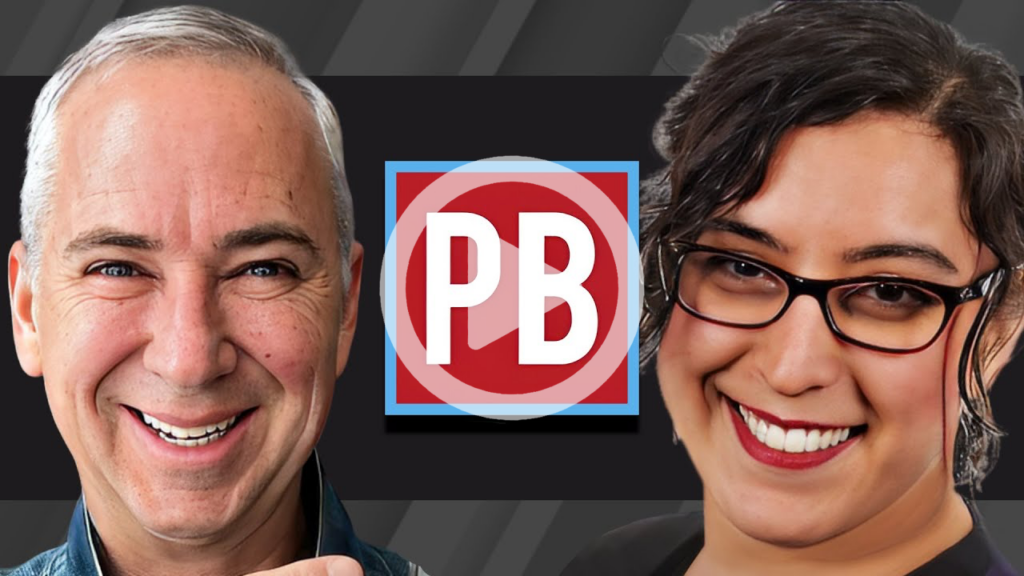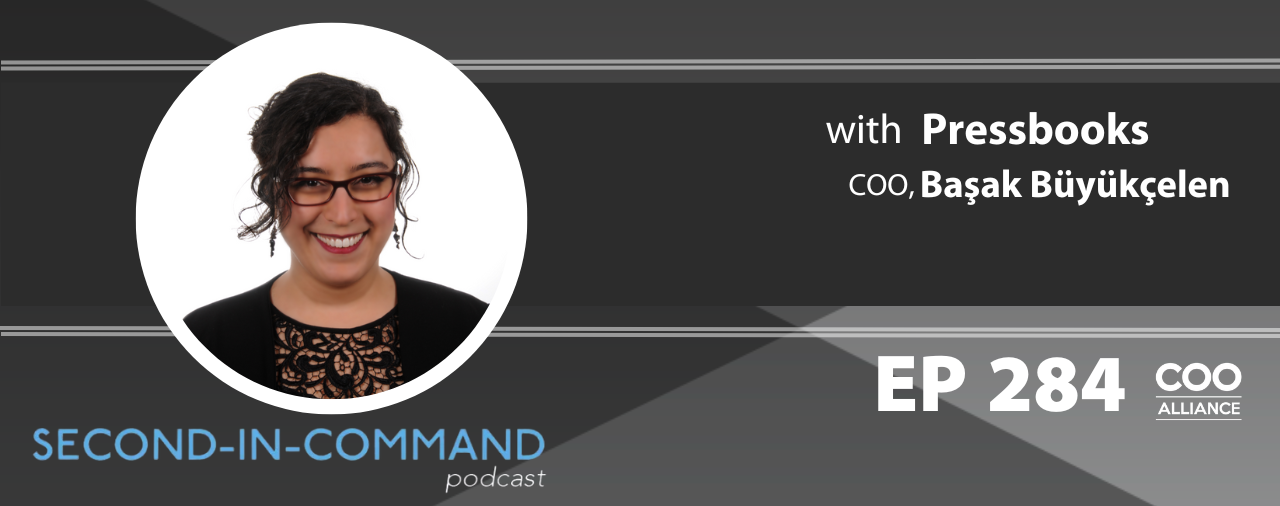Our guest today is Basak Büyükçelen, Chief Operations Officer for Pressbooks. Born and raised in Istanbul, Turkey, Basak describes herself as a storyteller, film enthusiast, photographer, IT manager, extrovert and immigrant living in Montreal. She is the founder of Supper Society and co-founder of Code Forward. Basak is also a published photographer and has edited and translated poetry and photography books. Her focus is on the ways technology can change the world without sacrificing the humanity of its developers and users. Striking a balance between efficiency and emotional intelligence, her leadership style reflects the type of innovation she wants for the world. In today’s episode, they discuss her journey and insights, with a focus on employee wellbeing.
Share This Episode On:
In This Episode You’ll Learn:
- The importance of adding more to your culture by hiring different people from different backgrounds.
- What it means to be an open source company.
- How to overcome the bias against hiring foreigners.
- How working remotely improved productivity and communication.
Resources:
Connect with Jake: Website | LinkedIn | Pressbooks
Connect with Cameron: Website | LinkedIn
Get Cameron’s latest book “Second in Command: Unleash the Power of your COO”
Subscribe to our YouTube channel – Second in Command Podcast on YouTube
Get Cameron’s online course: Invest In Your Leaders
—
We have the pleasure of speaking with a true visionary in the tech world. Join us as we dive into the world of Pressbooks with none other than Basak Büyükçelen, the incredible COO behind this open-sourced SaaS platform. Basak’s passion for innovation and forward-thinking leadership is evident in everything she does, from her unorthodox hiring practices to her office rent offsets for company retreats.
She’s a global citizen with business experience spanning Turkey, Canada, and Mexico. She’s here to share her journey and insights with us. With a focus on employee wellbeing, Pressbooks has implemented a company-wide 4-day, 8-hour workweek, a revolutionary concept in the tech industry. Basak knows that productivity gains can come from employee retention rather than simply working longer hours.
It’s not all about work for Basak. She’s also a pro at navigating cultural differences from hiring offshore talent as cultural additions to managing the drinking culture in Korean companies. She’s got some inspiring insights to share about her daily stoicism practice and how it helped her recover from corporate burnout. Sit back and relax and get, be ready to be inspired by Basak Büyükçelen, the innovative and trailblazing COO of Pressbooks.
—

Watch and Subscribe to our Podcast on Youtube
Basak, welcome to the show.
Thanks for having me.
Nice to see you again. You’re a COO Alliance member, which is why I said to see you again as well. Why don’t we dive right into what Pressbooks is? You’re the COO of a cool organization. Tell us a little bit about Pressbooks so we know where we can go. I’ve already got a bunch of questions I know I’m going to ask you too.
Pressbooks is a SaaS platform. We’re an open source SaaS platform where you can come in and publish your book. Originally, we started as a company that, if you have a book that you want to publish by yourself without the involvement of a traditional publisher, you could come in, pay us a fee, and publish your book. Put it on Amazon or wherever you like. We shifted quite a bit, especially in the last few years.
We almost primarily serve educational institutions. Educators will come to us, they will create their content, and they will adapt the content that we have. They will share the content that they have seen, and it allows them to share these textbooks with students so that textbooks so that students don’t have to necessarily pay hundreds of dollars per textbook.
We’re quite popular, especially in the open educational resources land, where you give the textbook to the student, but it’s not only that we connect to learning management systems, we have interactive quizzes that you can build. It allows the educator to build their books, and use the books that we have to allow the students to understand, “Do I understand the context and the content?” They can go and do their quizzes. As a professor, you can say, “I don’t want to grade a quiz. Send me the results automatically.” We will connect your learning management system and we will say, “Here are the quizzes that your student has done.” The student even has a choice to send the best results if they’ve done the test multiple times. We’re a mission-driven organization, to say the least.
Who pays? How do you make your revenue?
It’s the universities that pay us. We don’t charge the student. We have a sliding scale, pricing system where if you’re a small university with little funds, we say, “You can start by $5,000 and you can go all the way up to $100,000 or more depending on how many students you have, how many books you want to create, how many people are going to use the system.” We talk about that when you come to us and we see what your needs are, and then we’ll give you pricing.
I would think that prior to a couple of years ago, building out an LMS and building out quizzes and building out testing and building out would’ve been expensive. I have a feeling you’re probably starting to leverage AI.
We haven’t even touched AI yet but is such a big topic because it’s not to use AI, but there’s a big fear in the educational space where professors are thinking, “How do I know if this essay was written by an AI?” Especially if you’re doing online quizzes and stuff, there’s a lot against that. Not to say we don’t want to leverage it, but there’s also the other point where there’s this genuine fear. You’re this professor. You gave homework and said, “Do this essay.” Now, how do you know if that essay is genuinely written by the students? There are ways of thinking about how we find ways to encourage authentic learning and authentic experiences.
The way we have been connecting to learning management systems and doing all these quizzes, there are already systems in place that we leverage, that we do use, and then we build our own. AI is becoming such a hot topic. It’s been around for a while, but with ChatGPT coming on now, it’s alarming for everyone everywhere. Professors have this fear that, “How do we know how much of this is genuine learning and how do we make sure that students use it as their leverage to learn and master their knowledge as opposed to cheating the system?”
Whereas my son is saying right now, “Is it cheating the system when this is a tool we’re going to be using for the next 50 years? Maybe I’m learning how to use a system that’s going to become necessary?” He got a point. It’s like me telling my kids they have to learn how to type and my kid is like, “I’ve been typing my whole life.” I had to go to typing class, but my kid started typing. I’m like, “How did you learn?” He goes, “I don’t know. The keys are right in front of me.” I’m like, “What?” You said something that intrigued me. You said you’re an open-sourced SaaS company. What does that mean?
Open source means that the code and the systems that we have are available. You can go grab our infrastructure, our coding system from GitHub. You can use it. Let’s say you’re a university. You have your own infrastructure. You have your own, DevOps team, and they want to take Pressbooks as a product. They want to implement it on their campus. They can do so completely for free. We don’t charge them.
As a matter of fact, we support them. Open source also means you have all these contributors who can come in and contribute to your code and they can make the product better. That said, we also have to make a living, because we are a team, and we want to be able to pay our people. We won’t generate revenue. That’s where the paying customer comes in for multiple reasons.
A) They don’t want to go through the hassle of keeping the infrastructure secure. They don’t want to pay. They don’t want to hire this person who’s going to maintain it. They come to us and say, “I’ll buy your system. I know you’re hosting it. You are in charge of keeping it secure.” There are some features that we can say, “We’re going to do this for people who are paying us the extra fee as an add-on.” That’s where the revenue numbers come in. That’s why people come to us. We’ve even had open source users who’ve been using Pressbooks and they’ve been hosting it themselves for years. They said, “If we had enough to do it for us, we’ll come to pay you.” We’re like, “Gladly.”

Open-Source Company: Customers pay open-source companies if they don’t want to go through the hassle of keeping their own secure infrastructure or hiring a person to maintain it.
You’ve got a fascinating backstory. Let’s go into some of your backstory before you got to be the COO. You were originally from Turkey. You’re sitting in Mexico, but you’ve been living in Montreal, Canada, where my youngest is going to school. Walk us through that journey.
I’m originally from Turkey. My first job was at a bank and then I started working for LG Electronics. It was a great learning experience, but I felt I didn’t want to be in Turkey. I wanted to be somewhere else. I don’t think it’s a unique experience. There are many people. That’s why there are so many immigrants. They want a better life. I also happen not to be happy at the job where I had to like, wear a suit, go into the office, and fit into this persona that I had to fit into. I want something better. I ended up applying to Vancouver Film School in Vancouver. I found that they were starting this program called Entertainment Business Management.
I was like, “I want to be in the film industry. I have a background in finance. Maybe I can be a line producer where I can do budgets for films and stuff.” That dream started. I moved to Vancouver, studied at Vancouver Film School, and then I was like, “I don’t want to do budgets. I want to make films.” I ended up making films, writing them, directing them, producing them. I had a short-lived for reasons outside of my control and I’m not going to get into it here. A short-lived, directing career, it was incredible. Five years of writing films, producing films, and going to festivals, it was fascinating. I had to leave Turkey.
At this point, I’d come back to Turkey after studying in Vancouver, come back to Turkey, do all of that. I said, “I need to get out of here.” Within that period, I applied through the Federal Skilled Worker Program to become an immigrant, a permanent resident in Canada. That took a long time because it always does. It costs you a lot of money. It takes a long time. I was like, “I’m going to move to Canada.” I ended up visiting Montreal and I said, “I’m not living in Vancouver. This is the place I want to be.” Montreal was the melting pot of Europe and North America. The problem was I spoke zero French. I was like, go back to school, study French and learn French.
I’m ready to work. I started applying for jobs and I was like, “Nobody’s hiring me.” Why? I have a great resume. I’m a well-traveled, well-spoken person. I’m fluent in English and bilingual. There’s a lot that I can bring to the table, yet six months and no one will call me for an interview. Now as someone who does hiring, I understand why. There’s always the fear that someone from another country, someone from another culture, is not going to fit well with your culture.
They’re not going to understand the intricacies of some stuff. Maybe there might be misunderstandings, but there are so many ways to get around that. Bringing different people will only enrich your culture. In Pressbooks, we go out of our way to bring these immigrants in. We pay for their lawyers. We pay for their Visa applications. We do it for them. We can bring this talent that will only make us a better company. I flipped it around and it’s going well.
Is the company based in Canada?
Yes. Our head office is in Montreal. We’ve shut down our offices and we can talk about that.
You’re bringing skilled people in from other countries into Canada. What’s the process? You mentioned it to me offline, I was intrigued. You said it was called something VanHack?
Yes. We started working with a company called VanHack Technologies. They’re a typical recruiting company with an additional, “Let us hire these people for you and help you bring them into Canada.” When you pay Van Hack, when you pay the typical 15% to 20% recruiting percentage that you would normally pay any other recruiter. They have cut their margins enough that that fee that you pay to them goes to their lawyers and their immigrant consultants.
They do the application for you that this person that you want to hire from Argentina, from Brazil, from Mexico, whatever that might be, from Dubai, they bring them. They apply on behalf of you or you do it with them in a way. You get into an agreement with the Federal Government of Canada. Depending on what your province is, we have one with Quebec where we say, “We’re going to bring these three people because we can’t find this talent in Montreal, Full-Stack developers, DevOps engineers, whatever that might be.”
In exchange, I say, “The next 3 hires or 4 hires that I’m going to make are going to be local permanent residents or citizens.” You say, “I’m giving back to society to the Canadian taxpayers by creating more jobs for them.” I know the next sales marketing, customer support people that we’re hiring, we will do it from Canada. You also go into a negotiation with the government and say, “In exchange, we’re bringing these people. We’re going to create knowledge transfer programs.”
You brought this person because they hold this particular knowledge on whatever technical field that they work in. They will come and train the rest of your team. You hold this knowledge. When that Canadian folk that you’ve hired as a junior PHP developer goes elsewhere, they’ve been trained. This is not so well known. I’m fascinated that this is not a program that we’re all not doing.
This is pretty intriguing stuff. I love that your approach to it came from something that you felt and saw. You reached out and found a different solution for it. It also clearly helps your organization. Can you walk me through one other thing? If we’re a company based in Canada, based in the US, based wherever, and we have that weird bias that we would like to overcome, which is that bias against hiring a foreigner.
How do we interview and know that they are going to be a good culture fit or they are going to have the right skillset? I get so tired of chatting with these taxi drivers who have an Engineering degree or they’re a doctor back in their foreign countries. What are you doing driving a taxi? How do we screen them and know that they are going to be a great fit? What do we do to give ourselves the comfort that these are diamonds in the rough, and we’re crazy not to be hiring?
You do your regular screening process. You have to have a very good hiring process in place. What I also find is we do cultural interviews, and often you should call them cultural ad interviews. You’re not going to fit somebody into your culture. You’re trying to add more to your culture by bringing these different people from different backgrounds, let’s say. It’s not just hiring. Where we are forgetting that it’s super important to do is to train ourselves to read, “How does someone from a different culture behave?”
One of the reading and training assignments that we have on our own boarding process is you have to go through a training that we provide. We pay for it where you learn how people from different cultures behave. You can’t generalize a culture and say, “People from Japan behave this way. People from Brazil behave this way.” There are so many traits there that you start catching on. If you train your people in understanding those clues when you work with someone from a different culture and start understanding that it is a cultural difference, you start embracing that. You start using that to leverage.
There’s a book that I always recommend reading, The Culture Map by Meyer. We always say, “Read this book and you’re going to understand why this colleague from the US will end up with a call in this specific way whereas this call from Brazil will not going to ask you many questions, because of understanding of different hierarchies.” When you train yourself and your entire team, that becomes an incredible source of power where you can leverage all these different backgrounds and a different understanding of company culture. It only enriches you. It’s not about hiring somebody who’s very skilled. It’s not about that. It’s so much more than that.
I love that you’re saying they’re not cultural differences, they’re cultural ads, which is intriguing. By the way, one of my closest friends ever is the former COO of Vancouver Film School. When was your last year at Vancouver Film School?
2009, I graduated from there.
Too early. Christopher Bennett was his name, but Christopher might have come in around 2012 and then was there in 2020.
It’s a fascinating school.
That’s a great school. I was blown away. I went for a tour of it and I was like, “It’s huge.” It’s ginormous. It’s the real deal. My son is obsessed with the film industry. He’s in Vancouver working in film and trying to get more and more gigs in film and loves the industry like you do. Talk to me about going offshore or moving from Canada, post-COVID or during COVID. You’re like, “Screw this,” sitting in an office. Your company went through an interesting transition with getting rid of the office and going offshore. Can you walk us through that?
Before the pandemic, we still had a couple of people who were working from the States or from elsewhere, contractors or people who were full-time employees that chose to live there. We always had this like, whenever we were going to hire someone, we would say, “The product manager who lives in the US should come and we should do an in-office onboarding.” The pandemic hit and we’re like, “What are we going to do, not hire until whenever?”
You don’t know. You have to adapt fast. We realized that working remotely was a huge addition to our productivity, to our understanding of how we communicate with each other when we’re not in the same room. It improved our communication style. It helped. First, like everybody, we started doing meetings for everything because you don’t have the water cooler conversation. You don’t have the regular, “Let’s work for coffee and sort the shit out,” now it has to be a meeting where you have to set it up.

Open-Source Company: Working remotely can be a huge addition to a team’s productivity. People within the team learn how to improve their communication styles.
You have to set up an agenda, but the Meetings Suck book is great. Thank you for that. Eventually, we realized, “Do we give up the office? Maybe it’s about time.” We pulled the survey and we said, “Do you want us to give up the office?” People were screaming, “No, I don’t want to stay at home with my children, with my dog. It’s so distracting. Please don’t give up the office. I’m going to be there as soon as the government allows me to do.”
Two years later, we pulled the same survey. The only person that said, “Yes, I would go to the office,” was me. I’m in Mexico. I’m so glad I was the only person that said so. We realize, “Why take that money that we pay in rent and put it in a retreat?” Pressbooks is going to a retreat in the Dominican Republic and we’re going to shape our next year’s OKRs.
The objectives and key results that we use, much the EOS system, we’re going to get together in person in an exciting location. We’re going to spend 3, 4 days working together and then in a couple of days we’re going to be swimming at the beach and what have you. I thought everybody wanted us to get out of the office in the beginning and people were like, “No, I have to go. I don’t want to be at home with my husband and my child.” It turned into, “No, I’m not going ever.” I’m glad that we consulted the employees on that because I would’ve kept the office honestly and then I wouldn’t be here in Mexico. That’s very sad.
That is bonus time. One of the things that we do at the COO Alliance is we tell all of our members that we guarantee they get a 10X return. If they come to all the events, they participate actively, they’re going to get at least 10 times the cost of membership. They’re going to get that in return. I say I want them to do that every month. I want a 10X times 12X, I want a big return.
Understanding that you can take what you used to pay in rent and use that money as an offset for an all-company retreat or even a couple of great quarterly or annual retreats for the employees makes so much sense. It’s not an expense, it’s an offset that you used to have the expense anyways. That’s brilliant. Super good idea. You also do something pretty unique that you mentioned earlier about the four-day workweek. Can you walk us through how it’s going?
It’s going great. I did a second survey to ask people how it’s going. I have seen so far about 70% of the people believe that we’ve seen an increase in productivity. A lot of people think if you’re working 32 hours, you have X amount of work to finish and you’re going to try and do it 32 hours. There are only so many meetings you can remove and so much better performance you can take out of people. There’s no way you’re going to be able to squeeze those eight extra hours in there and therefore, you’re not going to be as productive.
What people are missing about this is that productivity is not, “Here’s the input, here’s the output.” We have delivered X number of hours of work is not productivity. Productivity should be looked at as a whole where if you get to keep your people because they’re healthier, they rest better. They like the idea of having a three-day weekend. What will happen is your retention of your employees is going to go up. You’re not going to lose people. All those people who have the institutional knowledge, who have built in the code, built in the infrastructure sold all of those accounts are becoming more and more senior. You’re enriching your people. That’s one thing.
That’s another bonus time. Keeping employee retention can be enough productivity in and of itself.
Even if you do replace those people fairly quickly, it takes six months for someone to get started working with you into becoming the peak of their productivity. You’ve lost six months. I don’t know how it’s not so clear to all of us that it’s not about the hours are now less, and therefore, we’re not going to achieve as much. Forget about what you’re achieving on a weekly basis. Look at the big picture.
What else? You were continuing and I jumped in on the bonus time.
Burnout. I experienced burnout myself years and years ago. It’s such a traumatic experience for the person who’s going through that and who’s questioning why am I behaving this way. Why am I not performing well? Why am I unable to take on more work? Why do I not want to go to work? I’m going to say that it’s such a mindfuck. You’re constantly in your head, “Why am I reacting this way?” It takes a therapist to tell you, “You’re going through burnout. These are the symptoms you have to stop working.” When I was first told, “You’re having a burnout. You got to take a leave one month,” I said, “Absolutely not. I’m not leaving my job for one month because I’m worried everything is going to burn down.”
The more I resisted, the longer it took me to recover from that burnout. I was out for four months. It took me four months to get back to myself. Burnout doesn’t happen only because you work a lot. There are so many other additional factors. One of the reasons is because we’re trying to achieve so much, we’re trying to do so much and we always romanticize the idea of overwork. We proudly say, “I’m a workaholic,” and we try to sell this as a selling point in interviews. The usual, “I’m a perfectionist. I work too much.” All of this is BS. Let’s get over that. What do you do when you say to people and talk the talk and then walk it as well? “We’re going to be a four-day workweek company. We don’t want you to work more than 32 hours.”
You’re a 4-day, 8-hour workweek.
Yes. It’s not compressed 32 hours. You have to mean it and show it over and over again because everybody thinks you’re kidding. It’s normal to think, “What’s the catch? What’s going to happen? Am I going to lose my salary? Does it mean I won’t be able to get a promotion? Does it mean you’re going to hire somebody else?”
There are so many questions because it’s not normalized yet. When you get ahead of those concerns by doing a survey before you implement the four-day workweek, what are your concerns? Take them and then before you implement them, work through those problems. Improve your standard operating procedures, your processes, and your meeting time. Look at all the things that are taking so much time for us to be able to get through on a Friday afternoon.

Open-Source Company: If you want to implement a four-day workweek, look at all the things that take so much of your time for you to be able to get through on a Friday afternoon.
How do I work better? Address all of those concerns with the people and do a trial. We are hiring for multiple people and I used to hear all the time, why are you interested in Pressbooks? I would always hear, “Mission-driven organization. I like your company. I like open source.” I hear, “You’re a four-day working company.” We’re getting incredible talent. There are so many benefits to it that we’re only starting to see. I hope it’s going to become the norm.
I love the process behind it all. You’ve mentioned a couple of times serving employees. Is that something you do with practice? What are some other examples of when you survey them and why you survey them?
It’s interesting. I come from again, talking about cultural differences, where hierarchy, not only about Turkey, but I’ve worked for Korean companies for years. Hierarchy is super important. Even if you disagree with your manager, you don’t bring it up in a way. Somebody makes a decision and it trickles down from there. When I moved to Canada, I saw that it’s a different culture here and I should be able to speak up. I should be able to say that’s BS to my manager when they have a crappy idea. Practicing that is not that easy. Although I worked many years in Canada, I still felt I couldn’t quite shake off the, “I made the decision and I said so because I know better.”
Sometimes you do. Sometimes you have the experience more than someone that’s early in their career, but you miss that unique person’s feedback where they don’t have the baggage that you’re bringing about a certain decision. They have different approaches, different generations, and different cultures. My CEO is like, “Let’s ask everyone everything.”
We found this point. We now have a process where we say, “If we’re making a decision, these decisions, the C-Suite makes those decisions. These decisions, the managers of those departments are included in that decision-making process. These decisions, we talk to everybody on the floor.” We have this chart where when we’re making a decision, we sit down. We call them red flag decisions. He coined the term on it. It’s a red-flag decision if we know it’s going to affect everybody and we may not know better. That’s when we start surveying everyone.

Open-Source Company: If you don’t know how a business decision will affect the entire team, start surveying everyone.
Sometimes it’s to make a decision. Sometimes it’s to understand the issue more and to make better decisions at a team level. You explain why we’re serving. We’re not serving and taking the best response. We might be serving, taking information, and making a decision based on what we read too. You tossed out something intriguing as well. You mentioned you’ve done a lot of work with these Korean companies. Working with Korean leadership teams, what insights can you give us there?
It’s a completely different culture. It is improving. There is gender bias, especially in Korean companies. It’s not unique to Korean culture. It’s everywhere, but it is more subtle in some companies and less so in other companies. There is a fascinating drinking culture embedded in the business. When I was working for LG Electronics, every Thursday, the manager of the logistics team would take his team over to a bar to get them to talk and learn how to talk business over drinking. Teach them to drink better so that you can outdrink the Chinese and get better pricing. There are fascinating stories. I was in the Netherlands. I went to what I did not realize was an interview.
I thought I was invited to dinner. It was a twelve-people dinner with different budgeting specialists from LG Electronics working in different locations. I was working in Turkey at the time and there were other people from Greece, here, and there. I thought it was a dinner. There were 200 attendees at this conference. I had no idea that only twelve people were there. We were fed a snake and a lot of booze. What I realized at the end of this three-hour dinner was, “Were you going to eat the snake?”
They want to know, “Are you open-minded? Are you going to refuse something right off the bat? Are you going to be able to say yes to something that might be not very comfortable for you, but it is in their own culture to eat that?” I was talking to someone who was probably the VP of Finance or something. He looked at me and he said, “I’m too drunk to go home.” I said, “I’ll drive you.” He gave me his car keys. That was him testing me. Did I hold my liquor well? Can I drive him back home? These are fascinating things to see. Is this person right for you?
I’m curious what would happen with somebody because drinking is becoming such not a taboo, but so many people are migrating away from drinking. Can you navigate the Korean work culture and be someone who doesn’t drink?
Yes. I faked my drinking many years before that. There was a time I decided I didn’t want to drink for a few years. When I had that interview, I had gone back to drinking and I was perfectly fine drinking in modest amounts. When I first started working for LG Electronics in Turkey, we had a couple of managers coming from Korea. It was my job to take him out to a restaurant with my own manager.
I knew if I say I’m not drinking, it’s not that I’m going to lose my job. It’s not that bad. You understand to read the subtleties. I gave some tip to the waiter and I was like, “Keep the liquor coming but make mine.” I didn’t drink the entire night. Nobody knew. Everybody else went happily home. they were super excited to be in Turkey. They invested in the factory where I was working in. Things went great. You always figure a way out. This is several years ago.
Now it’s different. There’s political correctness. There’s work culture. Understanding these are also different. I did an internship at a film company in Vancouver and one of the owners was Korean. He would call me at 2:00 in the morning and for me, that was normal. When I mentioned this to his Canadian co-partner, he was like, “That is not okay. He can’t call you.” I’m like, “Why? My Korean boss in Turkey called me at 2:00 in the morning all the time.” We’re all changing and adapting. That’s why it’s important to understand these different cultures.
Read books, do some trainings, and train your own people in understanding when they react to you in a certain way, it might come from their cultural background. They may not feel comfortable to speak up more. Especially as managers, we figure out, “I should ask that person’s opinion in a more formulated way to tell them, I want you to speak up.” I put it in their performance reviews. I know you’re shy. We’re all different people. Some people talk more than others, but I want to hear from you more and they open up.

Open-Source Company: As managers, you should figure out why an employee reacts to you in a certain way. This might come from their cultural background.
I want you to talk to your 22-year-old self, getting ready to start her career. What advice would you give the 22-year-old that you know to be true now?
Practice stoicism. I try to practice it every day now, but the earlier you start to understand to deal with your emotions, you become a better person. You become a better future manager. You become a better colleague. That’s one thing. Second, if I could go back many years ago, I’d say, “Put on a regimen of working out every morning for 10 minutes.”
It’s so easy to implement that earlier in your life and it pays off. As we get old, we don’t realize we’re getting old. Implementing that workout routine in your 40s is so much harder. Investing in myself is what I would say. A career is going to come. Career follows. If you need to invest in your emotional state and learn how to deal with problems head-on and also, invest in your body. It’s going to beat you later. That’s what I’d say.
Basak, thank you so much for sharing. In 270 episodes, you’re the first person I’ve heard say mention stoicism and that is awesome. Brian Holiday and I go way back through a couple of masterminds and he’s good writing around that whole space too. Thank you for sharing on the show. We’ll see you at our monthly event.
Thank you so much, Cameron. Take care.
Pleasure.





